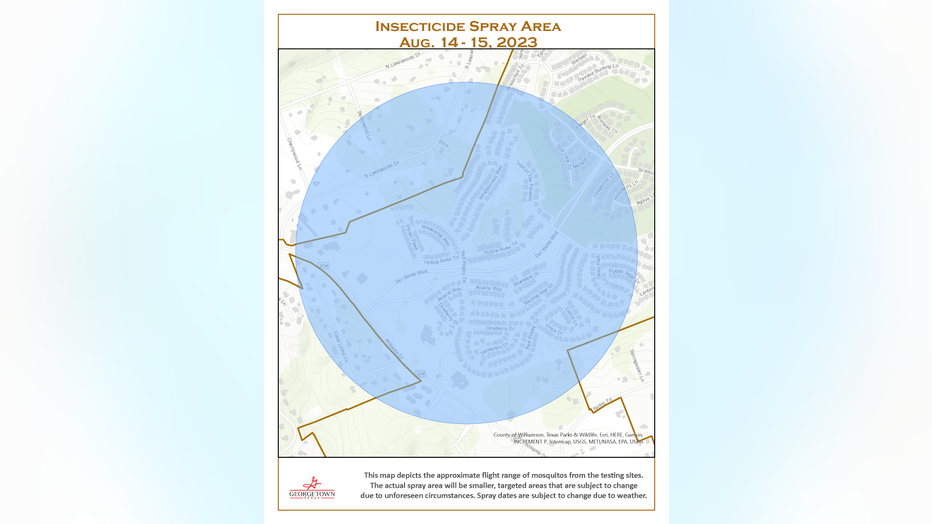Positive West Nile sample found in Georgetown; city schedules spraying
GEORGETOWN, Texas - Another mosquito trap sample in Williamson County has tested positive for West Nile virus.
The positive sample was collected on Aug. 8 from a trap site near the Yellow Rose Trail in Sun City. The last time a sample from this site tested positive was in August 2020.
The City of Georgetown says that in response to this latest positive sample, it will be conducting truck-mounted ground spraying on the evenings of Aug. 14 and 15, weather permitting, in the area seen in the map below.

RELATED COVERAGE
- Mosquito trap tests positive for West Nile virus in Brushy Creek MUD
- More positive West Nile samples found in Cedar Park, Brushy Creek
- Positive West Nile Virus mosquito pool identified in East Austin
Although the mosquito control product poses no significant health risk, the City says people and pets may want to stay indoors during the spraying if possible.
The use of the pyrethrin-based insecticide will reduce the adult mosquito population in that area, says the City. Spraying will be done if the wind speed is less than 10 mph.
Since West Nile testing began in Williamson County in May, 13 samples have tested positive. However, no human cases have been reported in the county to date.
What are the symptoms of West Nile virus?
Symptoms of infection may include fever, headache, and body aches, a skin rash on the trunk of the body, and swollen lymph nodes. Those age 50 and older and/or with compromised immune systems are at a higher risk for severe symptoms, which may include stiffness, disorientation, coma, tremors, vision loss, paralysis, and in rare cases, death.
What can I do to prevent West Nile virus?
The most important way to prevent West Nile virus is to reduce the number of mosquitoes where people live, work, and play.
Health officials strongly encourage everyone to remain vigilant about protecting themselves from mosquito bites and preventing mosquito breeding on their personal property. Mosquitoes breed in standing water, needing as little as one teaspoon. By draining all sources of standing water in and around your property, you reduce the number of places mosquitoes can lay their eggs and breed.
Eliminating places where mosquitoes can breed and reducing the chances of mosquito bites are the most effective lines of defense against exposure to West Nile Virus. As part of its Fight the Bite campaign the Health District recommends the 3 Ds of mosquito safety:
- Drain standing water in flowerpots, pet dishes, or clogged gutters so mosquitoes don’t have a place to breed and treat water that can’t be drained,
- Defend by using an EPA-registered insect repellent, and
- Dress in long sleeves and pants when outdoors.
For more information, go to the WCCHD website or visit the Texas Department of State Health Services West Nile website.

